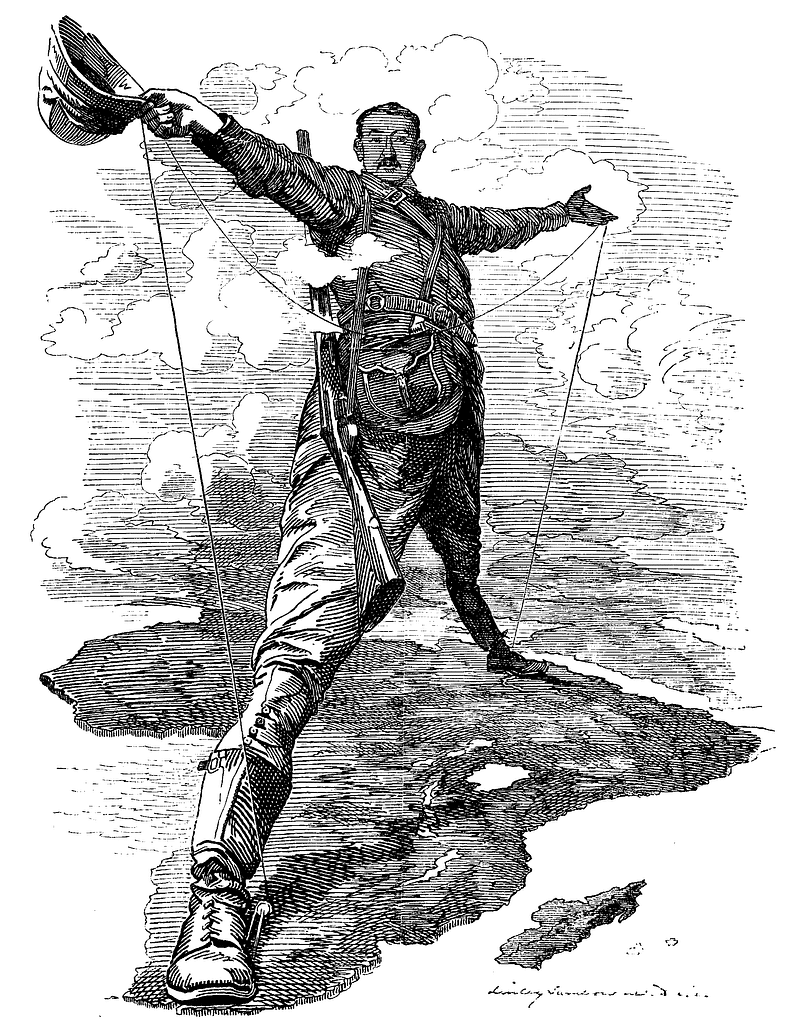Among a certain species of “critical” historian, it is an article of faith that Europe’s remarkable economic ascent was built not on its institutions, not on liberty, not on commerce, but on the systematic looting of the rest of the world. In this telling—descended from the anti-imperialist rhetoric of the 1960s New Left—Europe’s “miracle” was a simple matter of taking what didn’t belong to it, whether gold and silver from the Americas, spices from the Indies, or raw materials from Africa and Asia.
This narrative has the advantage of being emotionally satisfying to those looking to discredit the Western achievement, and the further advantage of being easy to repeat in a single sentence. Unfortunately, it has the corresponding disadvantage of being historically superficial, economically sloppy, and logically unsound.
The first and most obvious flaw in the “plunder thesis” is that the behavior it identifies—state-sponsored extraction—was hardly unique to Europe. The Mughals in India, the Ottomans in their vast domains, the Ming and Qing in China, and a dozen other imperial systems practiced the same basic pattern: conquer foreign peoples, squeeze the provinces for revenue, channel it to the court, and use it to fund the trappings of power.
The imperial Chinese state ran one of the most sophisticated tax-gathering systems in the premodern world, operating on a scale that dwarfed any European realm of the same era. The Mughal Empire extracted a staggering share of agrarian output—by some estimates as much as half—from its subjects. The Ottomans imposed taxes, tolls, and monopolies across three continents.
And yet none of these systems generated anything like Europe’s sustained economic growth. They produced splendor at the center and stagnation at the periphery, a cycle of courtly luxury and provincial impoverishment as old as empire itself. That they failed to “take off” while engaging in precisely the sort of extraction Europe is accused of should give pause to those who treat extraction as a sufficient explanation for development.
The second problem with the plunder thesis is its reliance on shock-value numbers divorced from economic context. One oft-repeated claim is that Britain “stole” the equivalent of $45–$50 trillion in today’s dollars from India. This number—originally floated by a handful of anti-colonial economists—has been cited endlessly in essays, activist literature, and social media graphics.
Even leaving aside the highly speculative nature of such conversions across centuries, the raw figure conceals more than it reveals. Spread over the three centuries in question, the “annualized” extraction is far smaller than the headline implies. Once one deducts the costs of maintaining the empire—armies, administration, infrastructure—one is left with a fraction of a fraction of British GDP.
That fraction mattered to Britain’s ruling elite, but it was nowhere near the scale required to explain the Industrial Revolution, the technological efflorescence, or the doubling and redoubling of living standards that characterized Europe’s long ascent. If imperial plunder were truly decisive, one would expect the great colonial empires of antiquity—Rome, China, the Caliphates—to have undergone similar industrial transformations. They did not.
The real explanation lies not in the fact of extraction but in the framework within which European societies operated. As Ralph Raico and other economic historians have stressed, post-Roman Europe was a politically fragmented, contractually bound, and legally pluralistic civilization. No ruler, however ambitious, could hope to command the kind of untrammeled authority enjoyed by a Mughal padishah or a Chinese Son of Heaven.
Princes, kings, and city councils had to bargain with nobles, estates, guilds, and chartered towns to raise funds. Law was often codified in charters and compacts that bound rulers to respect certain rights. Property could not be confiscated at whim; taxation usually required negotiation; merchants and artisans could take their skills and capital to a neighboring jurisdiction if mistreated.
This polycentric order created something unprecedented in history: competing polities forced to provide tolerable governance or risk losing their tax base altogether. It was this competition—and the secure property rights and legal predictability it fostered—that made long-term investment possible and rewarded innovation.
History is full of examples of states that grew fat on tribute and plunder only to ossify. The silver fleets from the New World enriched the Spanish crown for a century, but they also contributed to inflation, dependency on imports, and a neglect of productive industry. Without institutional reforms, extraction merely distorts incentives, encouraging rulers to treat wealth as a zero-sum game of seizure rather than a positive-sum process of production.
The idea that Europe’s rise was due to theft ignores the fact that the decisive transformations—mechanized industry, modern finance, sustained growth—originated not in the colonies but in the European heartlands, often in regions with little or no overseas empire. Switzerland, the German states, the Dutch Republic, and northern Italy each made enormous contributions to Europe’s economic and cultural dynamism without vast colonial possessions.
It is telling that the plunder thesis remains most popular in academic subfields still steeped in the moral categories of 1960s anti-imperialism, where indicting the West often takes precedence over explaining it. The intellectual heirs of this tradition see history as a morality play: Europe’s wealth must be the wages of sin; the rest of the world its innocent victim.
This framing collapses under scrutiny. Yes, imperialism was exploitative and unjust. But exploitation was the norm of premodern politics, not the exception. The reason Europe broke from that norm—producing societies where the average person could live longer, work less, and consume more than at any previous point in human history—cannot be reduced to the mechanics of tribute-taking.
To understand Europe’s takeoff, one must ask not only what resources flowed into it, but how its societies used them. The difference between a British merchant-investor reinvesting profits in a coal mine and a Mughal grandee spending revenue on court pageantry is not the size of the extraction, but the surrounding institutions. In Europe, decentralized governance, contractual politics, and the legal protection of property created a fertile ground for productive enterprise.
The plunder thesis offers an alluring shortcut: it explains a complex historical transformation with a single villain and a single crime. But serious history requires more. Europe’s rise was not the automatic fruit of overseas theft—if it were, the world would have seen many “European Miracles” long before the eighteenth century. What made the West different was not that it extracted wealth, but that it learned to generate it. That is the real lesson worth learning—and the one the plunder-mongers prefer to ignore.

































